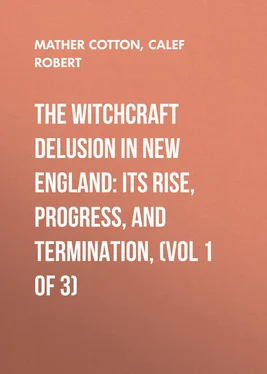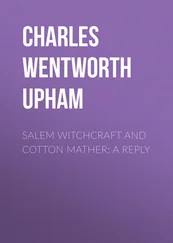Cotton Mather - The Witchcraft Delusion in New England - Its Rise, Progress, and Termination, (Vol 1 of 3)
Здесь есть возможность читать онлайн «Cotton Mather - The Witchcraft Delusion in New England - Its Rise, Progress, and Termination, (Vol 1 of 3)» — ознакомительный отрывок электронной книги совершенно бесплатно, а после прочтения отрывка купить полную версию. В некоторых случаях можно слушать аудио, скачать через торрент в формате fb2 и присутствует краткое содержание. Жанр: foreign_antique, foreign_prose, на английском языке. Описание произведения, (предисловие) а так же отзывы посетителей доступны на портале библиотеки ЛибКат.
- Название:The Witchcraft Delusion in New England: Its Rise, Progress, and Termination, (Vol 1 of 3)
- Автор:
- Жанр:
- Год:неизвестен
- ISBN:нет данных
- Рейтинг книги:4 / 5. Голосов: 1
-
Избранное:Добавить в избранное
- Отзывы:
-
Ваша оценка:
- 80
- 1
- 2
- 3
- 4
- 5
The Witchcraft Delusion in New England: Its Rise, Progress, and Termination, (Vol 1 of 3): краткое содержание, описание и аннотация
Предлагаем к чтению аннотацию, описание, краткое содержание или предисловие (зависит от того, что написал сам автор книги «The Witchcraft Delusion in New England: Its Rise, Progress, and Termination, (Vol 1 of 3)»). Если вы не нашли необходимую информацию о книге — напишите в комментариях, мы постараемся отыскать её.
The Witchcraft Delusion in New England: Its Rise, Progress, and Termination, (Vol 1 of 3) — читать онлайн ознакомительный отрывок
Ниже представлен текст книги, разбитый по страницам. Система сохранения места последней прочитанной страницы, позволяет с удобством читать онлайн бесплатно книгу «The Witchcraft Delusion in New England: Its Rise, Progress, and Termination, (Vol 1 of 3)», без необходимости каждый раз заново искать на чём Вы остановились. Поставьте закладку, и сможете в любой момент перейти на страницу, на которой закончили чтение.
Интервал:
Закладка:
Nevertheless, strong Ground having been taken that Witches existed, and Persons reputed Witches having been prosecuted with the utmost Rigor, and unrelenting Perseverance for a long Time, the chief Agents in these bloody Proceedings, firm in their Convictions that they had done righteously, deemed it incumbent upon themselves to keep the People to the same Opinions. This was the Origin of this unfortunate Book, " The Wonders of the Invisible World ;" the chief Part, or perhaps all of which, was composed while above one hundred poor People in and about Salem and Boston were suffering a wretched imprisonment in the filthy and barbarous Jails of those Days, to which Jails and Prisons of our Days are in Comparison, Palaces. It was doubtless no sooner determined that the Proceedings against the Witches should be given to the World, than the Person was designated who should perform that Service. And from the very opening of that Work it is at once discovered, that it was intended as a "Defence" of what had been already done, as well as to urge a Continuance of those Proceedings, "until the Land was fully purged of the Demons which infested it."
For a long Period, the Publication of Books detailing the Doings and Prosecutions of Witches seems to have extended rather than abridged the Belief in Witchcraft. This may be accounted for in Part from the Consideration that the Teachers of the People were themselves groveling in the Mire of Superstition. A more particular Reference to some of the Works best known somewhat more than two Centuries ago shall here follow.
One Thomas Cooper published in 1617, a Work of this Title, "The Mystery of Witchcraft. Discouering, the Truth, Nature, Occasions, Growth and Power thereof. Together with the Detection and Punishment of the same. As also, the Seuerall Stratagems of Sathan, ensnaring the poore Soule by this desperate Practize of annoying the Bodie: with the seueral Vses thereof to the Church of Christ. Very necessary for the redeeming of these atheisticall and secure Times."
This Author dedicated his Work to the "Maior and Corporation of the Ancient Citie of Chester," &c., in which Dedication we find the following, which, throwing some Light on the reverend Dealer in Darkness, is extracted. He commences, "Diuers, and verie weighty haue been the Motiues (right Worshipfull) to induce mee to the Dedication of these my Labors in this kinde vnto your Worships.
"The first is, because my first Calling from the Vniversitie, to employ my Ministrie for the Edification of the Saints, was by the Gouernors of your famous Citie, to succeed that painefull and profitable Teacher, Maister Harrison, who was thence called by the King's most Excellent Maiestie, to be one of the sixe Teachers to those barren and needfull Places of the Country of Lancashire. And therefore, hauing both kind intertainment among you; and by some of you being furthered to a more settled Pastorall Charge in that Countie, I could not but leave some Memoriall of my Thankefulnesse vnto you herein.
"Secondly, my free Admission to that Pastorall Charge, together with the singular Providence of God, in directing my Ministrie for the informing and reforming of that ignorant People, who never before enioyed any constant Ministrie, as also his admirable Protection and Deliuerance of me from vnreasonable Men, that vsed all their Force and Cunning to hinder the Proceedings of the Gospel of Christ."
These Extracts are made because they give a Glimpse of the Life and Character of an Author, second only to King James as a Cultivator of Witchcraft. His Book is a small Duodecimo of 368 Pages, in the Close of which he says, "to the wise and humble Reader, I am not ashamed to acknowledge, that which thou canst not but discerne; that I have borrowed most of my Grounds from his Maiesties Dæmonologie, Mr. Perkins, Mr. Gifford, and others." And this truly may be added, "the Blind were led by the Blind," in the fullest Sense of the Maxim. Master Cooper further remarks upon the Labors of his royal Predecessor and others in these Words, "they have waded before mee heerein, to confirme the Authoritie thereof, against the Atheisme of these evill Dayes: that so each might have the perfect Honour of their owne Paines." 4 4 The Mysterie of Witchcraft , P. 363.
In his second Chapter he says, "it is proued that there haue beene, are, and shall be Witches to the World's End: both by sound Testimony, 1st, from the Word; 2d, from Antiquity; 3d, from pregnant Reasons, and so such Obiections answered, as seeme to contradict this Truth."
This most singularly superstitious Writer says there were good Witches as well as bad ones; that these good Witches are called the unbinding ones; because they undo what the bad Witch does, and yet is allowed to do good Offices with the Consent of the Devil. 5 5 Ibid, 211.
Good Witches performed wonderful Cures, according to the Belief of those Days. Even Burton 6 6 Anatomy of Melancholy , 221, Edition in Folio, 1651.
says, "they can effect such Cures, the maine Question is whether it be lawful in a desperate Case, to crave their Help, or ask a Wizard's Advice. 'Tis a common Practice of some Men to go first to a Witch, and then to a Physitian. If one cannot help the other shall." And Paracelsus declared, "that it mattered not whether a sick Person were helped by God or Devil, so that he were eased." Some, however, demurred to this, and affirmed that it was better to die than be cured by a Witch or a Sorcerer.
Further to illustrate the Subject, I shall have Recourse to Mr. Nathan Drake's Shakespeare, and his Times . That chief of Expounders of the "Immortal Bard," having had occasion to review the Subject of Witchcraft, and having made so clear and valuable an Analysis of it in his Examination of the Witches of Shakespeare, as is nowhere else to be found, I am, as will be the Readers of this Introduction, I apprehend, fortunate in being able to avail myself of the Labors of that eminent Scholar and able Antiquary.
The Play of Macbeth is founded on a Species of Superstition that, during the Life-time of Shakespeare, prevailed in England and Scotland, in a Degree until then unknown. In the 33d Year of Henry VIII, was enacted a Statute which adjudged all Witchcraft and Sorcery to be Felony without the Benefit of Clergy; but at the Commencement of the Reign of Elizabeth, the Evil seems to have been greatly on the Increase, for Bishop Jewel, preaching before the Queen, in 1558, tells her, "It may please your Grace to understand that Witches and Sorcerers within these few last Years are marvelously increased within your Grace's Realm. Your Grace's Subjects pine away, even unto the Death, their Colour fadeth, their Flesh rotteth, their Speech is benumbed, their Senses are bereft, I pray God they may never practice further then upon the Subject." 7 7 Strype's Annals , I, P. 8.
How prevalent the Delusion had become, in the Year 1584, we have the most ample Testimony in the ingenious Work of Reginald Scot, entitled "The Discoverie of Witchcraft," which was written as the sensible and humane Author has informed us, "in behalfe of the Poore, the Aged, and the Simple," 8 8 Epistle to Sir Roger Manwood , P. 1.
and it reflects singular Discredit on the Age in which it was produced, that a Detection so complete, both with regard to Argument and Fact, should have failed in effecting its Purpose. But the Infatuation had seized all Ranks, with an Influence which rivaled that resulting from an Article of religious Faith, and Scot begins his Work with the Observation, that "the Fables of Witchcraft have taken so fast hold and deepe Root in the Heart of Man, that fewe or none can, now adaies, with Patience indure the Hand and Correction of God. For if any Adversitie, Greefe, Sicknesse, Losse of Children, Corne, Cattell, or Libertie happen unto them; by and by they exclaime uppon Witches; – insomuch as a Clap of Thunder, or a Gale of Wind is no sooner heard, but either they run to ring Bells, or crie out to burne Witches;" 9 9 Epistle to Sir Roger Manwood , Chap. i, Pp. 1 and 2.
and in his second Chapter, he declares, "I have heard to my greefe some of the Minesterie affirme, that they have had in their Parish at one Instant xvij or xviij Witches: meaning such as could work Miracles supernaturallie," 10 10 Scot, Discoverie , Chap. ii, P. 4.
a Declaration which, in a subsequent Part of his Book, he more particularly applies, when he informs us, that xvij or xviij were condemned at once at St. Osees in the County of Essex, being a whole Parish, though of no great Quantitie." 11 11 Discourse of Devils and Spirits , P. 543; annexed to the Discoverie of Witchcraft .
Интервал:
Закладка:
Похожие книги на «The Witchcraft Delusion in New England: Its Rise, Progress, and Termination, (Vol 1 of 3)»
Представляем Вашему вниманию похожие книги на «The Witchcraft Delusion in New England: Its Rise, Progress, and Termination, (Vol 1 of 3)» списком для выбора. Мы отобрали схожую по названию и смыслу литературу в надежде предоставить читателям больше вариантов отыскать новые, интересные, ещё непрочитанные произведения.
Обсуждение, отзывы о книге «The Witchcraft Delusion in New England: Its Rise, Progress, and Termination, (Vol 1 of 3)» и просто собственные мнения читателей. Оставьте ваши комментарии, напишите, что Вы думаете о произведении, его смысле или главных героях. Укажите что конкретно понравилось, а что нет, и почему Вы так считаете.












